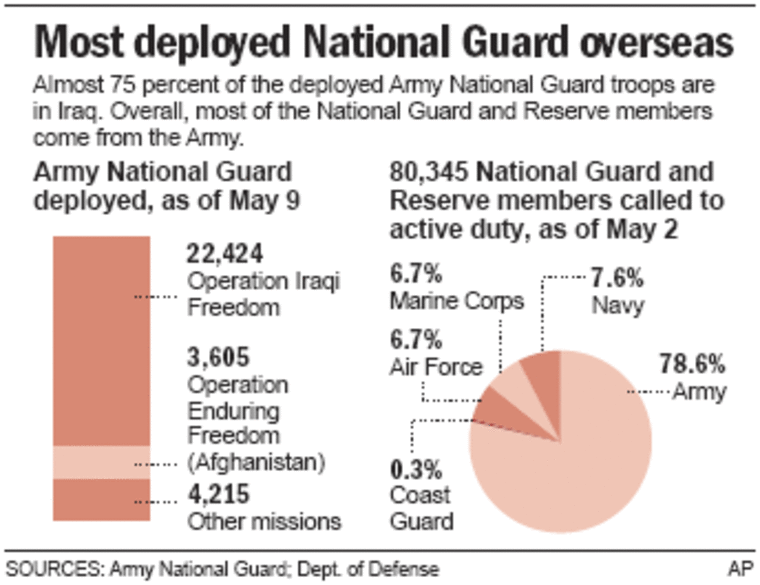With repeated deployments to Iraq and Afghanistan leaving state National Guards without nearly half of their required equipment, some governors are loudly questioning whether they will be able to handle the next hurricane, wildfire or terrorist attack at home.
“We are not going to be able to continue to rely on the National Guard as a full-time operational force,” North Carolina Gov. Mike Easley said.
Easley said his state has about half the equipment it needs and could probably respond adequately to a hurricane, but “a pandemic or something like that may be a different question.”
The widespread problem of permanently losing National Guard equipment to the war was pushed to the forefront this week when Kansas Gov. Kathleen Sebelius complained that shortages of equipment and well-trained personnel slowed Guard response to the killer tornadoes that ravaged her state.
“A lot of equipment has gone to Iraq and the equipment doesn’t come back when the troops come back,” California Gov. Arnold Schwarzenegger said Thursday.
The California National Guard is missing 700 Humvees and over 1,100 high-water vehicles — nearly half the number it’s supposed to have, according to documents reviewed by The AP. The Guard also has just 1,301 M4 machine guns, or less than a third of its required stockpile.
Arkansas Gov. Mike Beebe acknowledged that his state, with much of its National Guard equipment in Iraq, could have similar problems as Kansas if disaster struck.
Beebe said that much of the Arkansas Guard’s engineering unit is deployed in Iraq, and that the state’s Blackhawk helicopters also are overseas.
“It would be nice if the federal government would provide (soldiers in Iraq) with sufficient materials so that the states would still have sufficient materials for their people in case of a crisis,” Beebe said.
Worn-out equipment
National Guard troops take heavy equipment, such as Humvees, to Iraq where they are specially outfitted for combat and then left behind. Some states reported the equipment was eventually replaced or returned, but severely worn. Many are still waiting.
Connecticut, for example, is missing more than 200 high-mobility multipurpose vehicles, a Chinook CH-47D cargo helicopter, 1,500 pairs of night-vision goggles and 21 large support vehicles such as tankers, wreckers and heavy cargo vehicles.

White House and Pentagon officials have said that equipment sharing agreements among the states would ensure there would be adequate hardware available to handle any disaster. Such sharing is common place — 48 states that belong to an emergency assistance compact, an agreement to help each other in emergencies.
The Pentagon acknowledged this week that Army National Guard units had only 56 percent of their required equipment, the lowest levels since the Sept. 11, 2001, terrorist attacks. Defense Secretary Robert Gates said the Bush administration is asking Congress for $22 billion for the Army National Guard over the next five years, which would take Guard equipment levels up to 76 percent.
Maryland Gov. Martin O’Malley’s office released a memo this week saying that the state’s National Guard is facing “critical equipment shortfalls to meet its domestic homeland security mission.”
The report found “serious potential deficiencies in an array of basic, multipurpose items whose utility is clear for responding to incidents ranging from hurricanes to acts of terrorism.”
Obama weighs in on his home state
In a letter to President Bush this week, Democratic senator and presidential candidate Barack Obama said the National Guard’s equipment was stretched thin in his home state of Illinois.
Citing data from the Government Accountability Office, Obama added that the Illinois National Guard has only 45.6 percent of needed equipment on hand — less than half of what he said would be needed to handle a Mississippi River flood, respond to deadly tornadoes or evacuate civilians wounded in an attack.
“Our National Guard should never be overstretched to the point where we allow our homeland security and emergency response capabilities to erode,” Obama wrote. “We cannot afford to learn a lesson about unmet needs each time a disaster strikes.”
The biggest fear in Nevada is the upcoming fire season. Last year, fire burned more than 2,000 square miles in the state.
Guard officials there say they are ready, but Democrats in the Nevada Senate signed a letter urging Republican Gov. Jim Gibbons to petition President Bush to call Nevada guardsmen home by November. Gibbons does not intend to petition the president, his spokesman said.
Hurricanes, earthquakes on list of concerns
Oregon officials also worry about responding to earthquakes. Geologists say there is potential for a major inland earthquake or a tsunami off the Oregon coast.
“We are in as good shape as we can be, given the circumstances,” said Jake Weigler, spokesman for Gov. Ted Kulongoski. “But obviously, these war deployments have hurt our abilities to respond to these types of disasters.”
In Florida, where officials are preparing for a predicted busy hurricane season, U.S. Sen. Bill Nelson has expressed concern that the state National Guard has only 53 percent of the dual-use equipment it once had for responding to a storm or domestic disturbance, according to the GAO analysis.
But a Florida National Guard spokesman, Lt. Col. Ron Tittle, noted Thursday that the Guard responded to the 2004 and 2005 hurricanes with less equipment and fewer troops than are available now.
“It’s not a show stopper,” Tittle said. “We proved we can respond effectively in 2004 and 2004. We will be there. There is no question in our minds — we’ve got sufficient equipment to satisfy any emergency management requirements in Florida.”